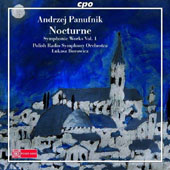

I accidently stumbled upon the Polish composer
Andrzej Panufnik (1914-1991) many, many years ago while perusing the basement bins of a downtown record shop, back in the
days when vinyl ruled. Back then, as I still do today, I loved to skip the big name composer sections, and scan through the miscellaneous letters of the alphabet, hunting
for treasure. As I flipped through the 'P' miscellaneous bin, I came upon an LP on the 'Unicorn' label (remember Unicorn?), with a very colorful and
attractive cover, of music by this obscure composer from Poland. I was fascinated enough to purchase that record and add it to my collection, which turned out to be an
excellent investment, because that composer has remained one of my favorites ever since.
The works on this Symphonic Works Vol. 1 collection, present a very good cross-section of this composer's output. The Tragic Overture,
composed during the war, under the influence of the fear and horror of daily life, and written in honour of the Warsaw Uprising, carries its title very well. It is driven forward
by an obsessive 4-note motif that gets tossed around from instrument to instrument, from strings to percussion and back, and builds to an almost unbearable level of
tension and oppression. At the end its full force is unleashed with heavy military percussion, drilling that 4-note motif with fists of anger, until a brutal final chord ends
it all.
The Nocturne, the main work on this CD, was written right after the war and instantly attracted attention by winning first prize in the Szymanowski
Competition in Poland, but then was banned within a year by the Polish authorities for being a "formalist" work. It carries its title very well in that it captures the essence
of night, of darkness and stillness, extremely well. The first few minutes in particular, are the definition of creepy darkness intensified by the dead quiet of night. A series
of soft rolls on the snare drum launch the dreamscape piece which very gradually builds to an ear shattering climax for full orchestra, including a piano, and then just as
gradually reverts back to the same lone snare drum roll to end the night. It's music that definitely lingers on the mind for a while after being heard. It has the effect of
penetrating deep inside and leaving an impression.
The following work, the Heroic Overture opens with a serious wallop, so get ready for a jolt following the ever so quiet ending of the Nocturne. Again,
by using a simple motif effectively, ascending harmonies in upward leaps of fourths, and well placed taps on the snare drum, Panufnik convincingly conveys a spirit of
heroism throughout this music, without having to resort to theatrical bombast to achieve it. Nothing in music sounds much more heroic than the last few measures of this
short but bold overture.
Based on the Katyn Forest in Russia where thousands of Polish prisoners-of-war were murdered, the Katyn Epitaph for solo violin and orchestra, reaches
heights of pathos and emotion similar in some ways to some of the best works by Gorecki and Pärt. Two more pieces round off this excellent introduction to the orchestral
works of Andrzej Panufnik. Lukasz Borowicz leads the Polish Radio Symphony Orchestra with a firm grasp of this composer's idiom
and technique, delivering readings that set new standards to follow. The vibrant CPO recording captures all the extremes of temperament within the
music to deliver a vivid account.
For his efforts in this project, Polish conductor Lukasz Borowicz has received the International Classical Music Award in the Special Achievement category.
Minimalism did not exist back in the 1940s when most of this music was written, but the composer himself wrote: "I have allowed myself to be dominated by a sense
of geometrical pattern and order; taking a single triad with its perpetual reflections as my fundamental structural element throughout a whole extended work. However
this stringent discipline of constant repetition of reflected triads was not chosen as a purely intellectual exercise (construction for construction's sake), but rather as a means
to an end: as an aid to expression - not a limitation to it. In all my works, I attempt to achieve a true balance between feeling and intellect; heart and brain; impulse and
design." {Andrzej Panufnik}
Jean-Yves Duperron